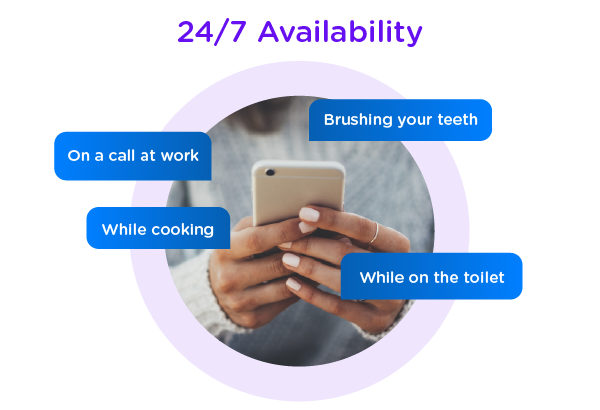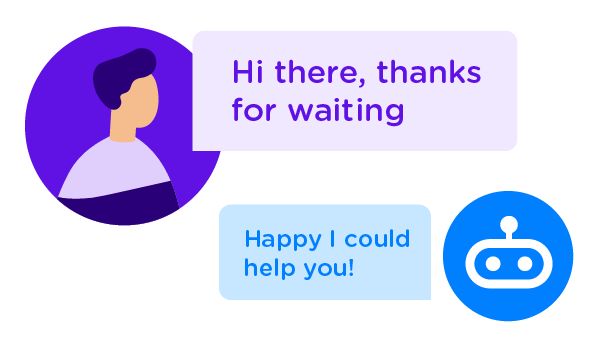The power of AI
Artificial Intelligence (AI) refers to machines that can think and behave like humans. The features that power conversational AI, such as chatbots, including language processing, machine learning, and cognitive computing, have a powerful impact on customer service solutions.
PWC notes that 59% of customers will leave their favorite brand after several lousy customer service experiences.
Customers from every demographic often use self-service channels, such as web and mobile, as their first point of contact for “pain-free” customer service. Thanks to advancements in AI and related communication technologies, customers understand that self-service channels are often the fastest and resolve problems and queries.
Many customer-centric businesses have already begun to make AI the driving force of their customer service offerings. Oracle reports that 8 out of 10 companies have implemented or plan to implement AI as a customer service solution – they cite greater efficiency and improved customer experiences as key to their growth.
Below, we explore the main benefits AI brings to customer services, how AI can grow your revenue, and practical guidance on effectively integrating it with your current customer service solutions. Let’s jump in.
The number one problem in customer service
Long wait times are the number one problem customer service teams face and result in lost customers and repetitional damage – directly impacting companies’ revenue. How long is too long for your customers to wait? 15 minutes? An hour? 6 hours?
MIT operations researcher Richard Larson states: “Often the psychology of queuing is more important than the statistics of the wait itself.” Boredom builds agitation. Uncertainty intensifies the stress of waiting.
Moreover, people who wait for less time than expected walk away happier than before – this motivates them to spend more. In comparison, an unhappy customer is less likely to buy and less likely to return.

Customers want fast access to support and information. PWC report that nearly 80% say speed, convenience, and knowledgeable help are the most important aspects of a positive customer experience. A remedy to lack of availability, AI-fuelled chatbots offer instant answers to customer queries and speedy solutions to customer problems. AI can quickly identify, categorize, and solve customer issues. For example, unlike their human counterparts, AI chatbots can effectively monitor website and in-app activity for customer issues 24/7.
The work that matters
AI can reduce workload and automate menial, time-consuming tasks for your customer service teams. According to ZDNet, 81% of companies using AI use the technology to gather preliminary information when a customer makes first contact. Moreover, 75% of companies use AI to automate handling routine customer issues – like password resets - and 74% to classify customer problems and route them to the right customer service representative.
With AI, customer service reps no longer need to spend hours resolving basic customer issues that technology can easily solve. Instead, AI can quickly handle basic tasks and reroute customers to service reps when they need solutions to more complex problems.
As such, AI chatbots free up agents’ time – this enhances both efficiency and productivity and enables your team to focus on the more fulfilling aspects of their job. This both improves morale and reduces employee turnover.
What do your customers want?
The businesses with the best customer service always consider their key customer segments' needs and preferences. Millennials and Generation Z do nearly everything on mobile – from paying rent to ordering pizza. The most innovative companies consider how the user journey for these important demographics needs to be optimized for mobile-first customer service interactions.
TechSee notes that Millennials and Generation Z want self-service customer service options and real-time responses via smart devices. In comparison, Baby Boomers typically prefer to speak to customer service reps on the phone. AI, combined with in-person and on-the-phone support, helps cater to every customer's preference.

In addition, conversational AI provides the more human elements of customer service consumers crave – without the long wait times that often go hand-in-hand with phone calls to customer service teams. As IBM notes, natural language processing (NLP) and machine learning enable conversational AI to process, understand, and respond to customer conversations naturally.
AI for a frictionless customer journey
Research from Dimension Data highlights that although 58% of companies agree that data and analytics will enhance the customer journey, 64% still don’t have data analysis capabilities that combine data from every channel. A seamless customer journey begins with an omni-channel customer service solution that reduces friction.
AI does away with the need to discuss an issue with multiple customer service agents, reducing irritation and friction for consumers. When utilized as a key component of an omni-channel customer service solution, AI passes all relevant data to agents – via online chats or phone calls. Customers don’t have to explain their problems to different agents repeatedly. Thus, AI can help provide a seamless, effortless, and integrated experience across every channel.
You can also use data to create a more complete picture of key customer segments. You can use AI to collect insights into customers' changing needs and frustrations. In addition, you can also utilize AI to provide comprehensive data on the non-linear ebb and flows of the user journey. Rich data makes for smarter, more agile customer-service solutions across every channel.
Cost-efficient, inherent scalability
Scaling your customer service team is expensive, from hiring and onboarding costs to sizable salaries and benefits packages. In comparison, it’s far faster and cheaper to scale with additional infrastructure that supports your current customer service offering.

As IBM highlights, conversational AI's innate scalability is helpful during sudden spikes in customer support demands, such as during the festive season or when products expand to new geographical markets.
Impact on the bottom line
Reduced wait times improve customer satisfaction and retention rates, the automation of repetitive customer service interactions, and an unbeatable capacity for cost-effective scalability. What do the benefits of conversational AI mean for a company’s bottom line?
The Watson Blog states, “Businesses spend $1.3 trillion on 265 billion customer service calls each year.” They add that AI offers a drop in per-query cost from $15-$200 (with human agents) to $1 (for virtual agents). Furthermore, Juniper Research reports that chatbots save companies an estimated $165 million yearly. Adding that chatbots can cut a company’s operational costs by up to 30%, it has the potential to have a significant impact on your bottom line (Smallbizzgenius, 2020).
Improve customer service with AI
Are you curious to see how AI can impact your customer service? From 24/7 availability to unlimited scalability, conversational AI promises several benefits that can revolutionize your current customer service solutions. In summary, these are the five notable benefits described:
24/7 customer service – solving the ‘availability problem’
The ability to automate menial, time-consuming tasks for your customer service teams
The capacity to deliver customer service that best fits the expectations and wants of different customer segments
AI-powered data and analytics for a frictionless customer journey
Unlimited, cost-efficient scalability
CM.com can help you provide exceptional AI-centric customer service to your customers with Conversational AI Cloud. Turn customer conversations into valuable engagements with a self-learning chatbot. Create your own AI-powered chatbot within the platform, no coding is required.







